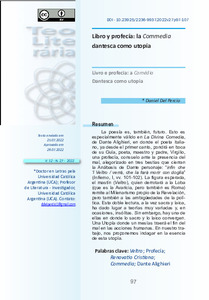Por favor, use este identificador para citar o enlazar este ítem:
https://repositorio.uca.edu.ar/handle/123456789/15165| Título: | Libro y profecía: la Commedia dantesca como utopía Livro e profecia: a Comédia Dantesca como utopia |
Autor: | Del Percio, Daniel | Palabras clave: | Dante Alighieri, 1265-1321; LITERATURA ITALIANA; POESIA ITALIANA; ANALISIS LITERARIO; UTOPIA | Fecha de publicación: | 2022 | Editorial: | Pontifícia Universidade Católica de São Paulo | Cita: | Del Percio, D. Libro y profecía: la Commedia dantesca como utopía [en línea]. Teoliterária. 2022, 12 (27). doi: 10.23925/2236-9937.2022v27p97-107. Disponible en: https://repositorio.uca.edu.ar/handle/123456789/15165 | Resumen: | Resumen:
La poesía es, también, futuro. Esto es
especialmente válido en La Divina Comedia,
de Dante Alighieri, en donde el poeta italiano, ya desde el primer canto, pondrá en boca
de su Guía, poeta, maestro y padre, Virgilio,
una profecía, consuelo ante la presencia del
mal, alegorizado en tres bestias que cierran
la Anábasis de Dante personaje: “infin che
‘l Veltro / verrà, che la farà morir con doglia”
(Infierno, I, vv. 101-102). La figura esperada,
el mastín (Veltro), quien derrotará a la Loba
(que es la Avaricia, pero también es Roma)
remite al Milenarismo propio de la Revelación,
pero también a las ambigüedades de la política. Esta doble lectura, a la vez sacra y laica,
ha dado lugar a teorías muy variadas y, en
ocasiones, insólitas. Sin embargo, hay una de
ellas en donde lo sacro y lo laico convergen.
Una Utopía donde un mesías traerá el fin del
mal en las acciones humanas. En nuestro trabajo, nos proponemos indagar en la esencia
de esta utopía. Abstract: Poetry is also future. This is especially valid in The Divine Comedy, by Dante Alighieri, where the Italian poet, from the first song, will put in the mouth of his Guide, poet, teacher and father, Virgilio, a prophecy, consolation before the presence of the evil, allegorized into three beasts that close Dante’s Anabasis: “infin che ‘l Veltro / verrà, che la farà die con doglia” (Inferno, I, vv. 101-102). The expected figure, the mastiff (Veltro), who will defeat the She-wolf (who is Greed but is also Rome) refers to the Millenarianism typical of Revelation, but also to the ambiguities of politics. This double reading, both sacred and secular, has given rise to very varied and, at times, unusual theories. However, there is one of them where the sacred and the secular converge. A Utopia where a messiah will bring the end of evil in human actions. In our text, we intend to investigate the essence of this utopia. |
URI: | https://repositorio.uca.edu.ar/handle/123456789/15165 | ISSN: | 2236-9937 (online) | Disciplina: | LITERATURA | DOI: | 10.23925/2236-9937.2022v27p97-107 | Derechos: | Acceso abierto | Fuente: | Teoliterária Vol.12, No.27, 2022 |
| Aparece en las colecciones: | Artículos |
Ficheros en este ítem:
| Fichero | Descripción | Tamaño | Formato | |
|---|---|---|---|---|
| libro-profecía-commedia.pdf | 375,79 kB | Adobe PDF |  Visualizar/Abrir |
Visualizaciones de página(s)
149
comprobado en 27-abr-2024
Descarga(s)
56
comprobado en 27-abr-2024
Google ScholarTM
Ver en Google Scholar
Altmetric
Altmetric
Este ítem está sujeto a una Licencia Creative Commons

